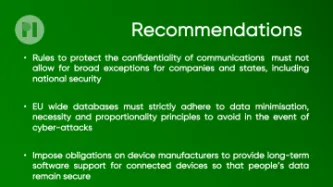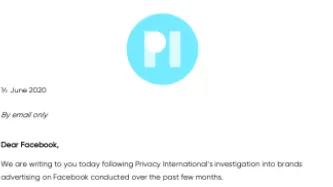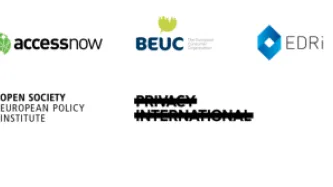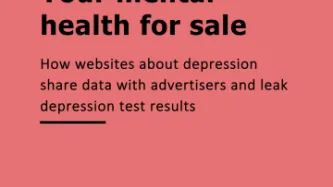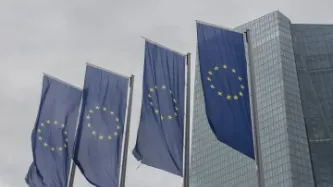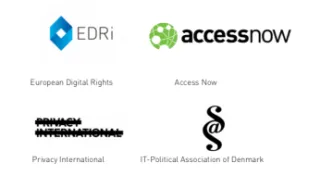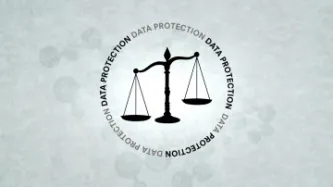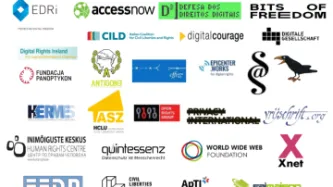Search
Content type: Long Read
In June 2025, a team of researchers exposed how Meta and Yandex abused Android and browser-specific tools to track users outside of their application and collect associated data. The technique used to achieve this was truly innovative, and akin to malware behaviour. It exploited protocols to break the isolation between apps and browser, a fundamental security concept meant to protect users. This allowed these companies to tie the browsing history of individuals with their accounts on the…
Content type: Advocacy
PI Opening Statement at PEGA Hearing on "Spyware and ePrivacy"
[check against delivery]
Thank you very much for offering us the opportunity to give evidence before this Committee for a second time.
Privacy International (PI) is a London-based non-profit that researches and advocates globally against government and corporate abuses of data and technology. For years we have been tracking the surveillance industry, challenging unlawful surveillance before national courts as well as the Court of…
Content type: Long Read
Introduction
In August 2019, when Facebook announced a few new features for advertisers such as ads in search, PI decided to take an in-depth look at what features the company offers its users when it comes to understanding its advertising practices. One of these features, which caught our attention is Facebook Ads Preference, a tool that among other things, lists businesses/advertisers that have uploaded your personal data to target you with (or exclude you from) ads on the platform.
Content type: Advocacy
Dear Facebook,
We are writing to you today following Privacy International’s investigation into brands advertising on Facebook conducted over the past few months.
Privacy International (“PI”) is a UK-registered charity that promotes the right to privacy at an international level. It is solely responsible for the research and investigation underpinning its publications.
In an attempt to exercise our rights under GDPR (specifically the right to data access) as Facebook users and better…
Content type: News & Analysis
GDPR was hard won. PI, together with other civil society actors, fought from the beginning for a version of the law that offers the strongest rights and protections in the face of intense industry lobbying.
Holding the hidden data ecosystem to account
Two years ago, we committed to using GDPR to seek to hold to account the hidden data ecosystem - those companies that amass and exploit large amounts of our data for profit.
Here’s some of the action we’ve taken:
In Nov 2018,…
Content type: News & Analysis
Almost a year and a half ago we complained about seven companies to three data protection authorities in Europe. These companies, ranging from AdTech to data brokers and credit rating agencies, thrive on the collection, exploitation and processing of personal data. They profile and categorise people - without our knowledge and infringing multiple legal requirements.
Now, the French Data Protection Authority CNIL has informed us that they are following the same route and …
Content type: Guide step
uBlock Origin (que no debe confundirse con uBlock, que es un proyecto diferente) es un bloqueador de anuncios independiente y de código abierto que utiliza una lista depurada de servidores y evita que tu navegador se conecte a estos servidores y evita que tu navegador se conecte a estos servidores con el propósito mostrarte anuncios.
Nota: En el mercado hay muchos bloqueadores de anuncios y puedes ensayar alternativas. Al utilizar un bloqueador de anuncios independiente, de código abierto y…
Content type: Guide step
Ad Blockers aim to prevent your browser from connecting to Ad servers and loading ads on webpages you are visiting. They can also block some parts of webpages that likely display ads. Blocking ads and connections to ad servers can help minimise the amount of data that the Adtech industry collects about you for targeted advertising.
Warning: Using an ad-blocker may cause some pages to display incorrectly or not at all. This guide also shows how you can modify the Ad Blocker's behaviour to allow…
Content type: News & Analysis
On 11 October 2019, Privacy International together with EDRi, BEUC, AccessNow and Open Society European Policy Institute, sent an open letter to EU Member States, to urge them to conclude the negotiations on the ePrivacy Regulation.
The letter highlights the urgent need for a strong ePrivacy Regulation in order to tackle the problems created by the commercial surveillance business models, and expresses the deep concerns by the fact that the Member States, represented in the Council of the…
Content type: Long Read
A new study by Privacy International reveals how popular websites about depression in France, Germany and the UK share user data with advertisers, data brokers and large tech companies, while some depression test websites leak answers and test results with third parties. The findings raise serious concerns about compliance with European data protection and privacy laws.
This article is part of a research led by Privacy International on mental health websites and tracking. Read our…
Content type: Report
The full report of Privacy International's study on how popular websites about depression in France, Germany and the UK share user data with advertisers, data brokers and large tech companies, while some depression test websites leak answers and test results with third parties. The findings raise serious concerns about compliance with European data protection and privacy laws.
Content type: News & Analysis
This article is part of a research led by Privacy International on mental health websites and tracking. Read our full report.
According to the World Health Organisation (WHO), 25 percent of the European population suffers from depression or anxiety each year, yet about 50% of major depressions remain untreated. This means that everyday thousands of people are looking for information about depression online. They take tests to find out how serious their symptoms are, they try to access…
Content type: News & Analysis
Mr. Zuckerberg has discovered the usefulness of regulation to protect our personal data. After years of lobbying against the adoption of the EU General Data Protection Regulation (GDPR) and of lamenting the ills of its implementation, Facebook seems ready to embrace European data protection law and even spread it across the world. Similar sentiments were recently expressed by Twitter.
This is a welcome change. Maybe the fines recently imposed by regulators and the increased scrutiny of…
Content type: Report
A video presentation of the finding of this report can be found here, as presented at 35th Chaos Computer Congress (35C3)Previous research has shown how 42.55 percent of free apps on the Google Play store could share data with Facebook, making Facebook the second most prevalent third-party tracker after Google’s parent company Alphabet. In this report, Privacy International illustrates what this data sharing looks like in practice, particularly for people who do not have a Facebook account.This…
Content type: Press release
Consumer groups, NGOs and industry call jointly for the Council of the EU to advance ePrivacy reform
On Monday 3 December, a coalition of more than 30 consumer groups, NGOs and industry representatives sent a letter to EU Ministers and the Council of the EU calling for the conclusion of the negotiations on the reform of the ePrivacy legislation.
The letter was sent prior to yesterday's (4 December) meeting in the TTE Council, with signatories sharing concerns over the slow progress of the negotiations in the Council of the EU despite the repeated scandals that demonstrate the clear and…
Content type: News & Analysis
Privacy International and other European civil society organisations write to European member states to urge them not to water down the e-Privacy proposal. We need more than ever strong regulation to protect the security and privacy of our digital communications, to protect us from being tracked online and to ensure that all our digital devices are set up with privacy by design and by default.
Content type: News & Analysis
This piece originally appeared here.
The tech industry is ramping up its attack and promulgation of myths around the ePrivacy regulation, as shown by Julia Apostle’s op-ed “We survived GDPR, but now another EU privacy law looms” (June 14). Let’s set the record straight.
Myth #1: the ePrivacy regulation will be detrimental for innovation. This predictable and tired argument is made anytime companies face regulation. It is particularly fallacious in this case. The aim of the ePrivacy regulation…
Content type: News & Analysis
We found the image here.
As the hype around the EU General Data Protection Regulation’s entry into force begins to die down, confidentiality of digital communications in Europe is facing a new challenge.
On one side, companies are lobbying to prevent the finalisation of the proposal for a new e-privacy regulation to protect privacy of communications and prevent unauthorised access to the data stored on devices, and the tracking of individual’s behaviour online.
On the other, a group…
Content type: Long Read
Today Privacy International together with 27 other organisations from across Europe urge European governments to strengthen the protection of privacy and security of online communications. The proposal to reform e-privacy in Europe was launched in January 2017. However, despite the clear and urgent need of this reform, recently demonstrated by the Facebook/Cambridge Analytica case, the negotiations by EU member states have been inconclusive. Worse still, some governments seem willing to…
Content type: Long Read
The ongoing Facebook and Cambridge Analytica scandal is a wake-up call for UK policy-makers who too often encourage and promote digital industries over the protection people’s personal data. The scandal has shown that the public is concerned by companies’ exploitation of their data. The current lack of transparency into how companies are using people’s data is unacceptable and needs to be addressed.
Reform should not be limited to the behaviour of individual companies. Consumers are confronted…
Content type: News & Analysis
We found this image here.
On 11 October, the LIBE Committee of the European Parliament votes on the draft e-privacy regulation. As the landscape of generation, collection, and other processing of data in the digital sphere evolves, the proposal seeks to update the rules on confidentiality and security of electronic communications and online activities.
Unsurprisingly, companies whose business models rely on tracking individuals online have been busy lobbying against the new regulation. The…

